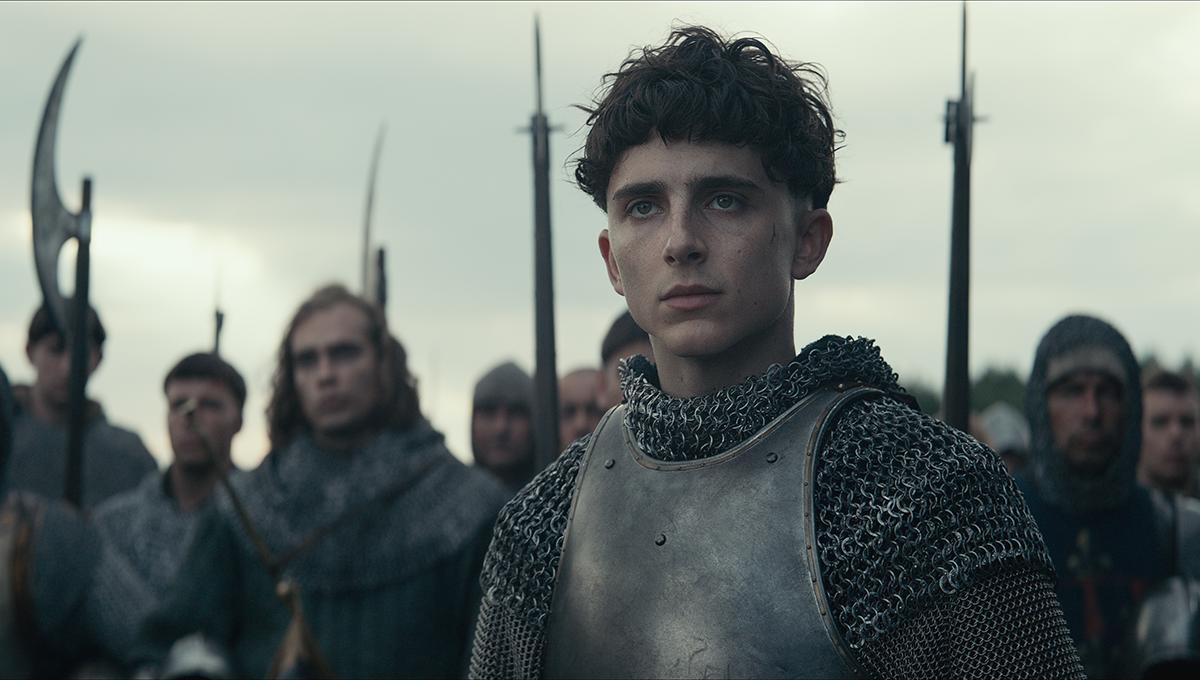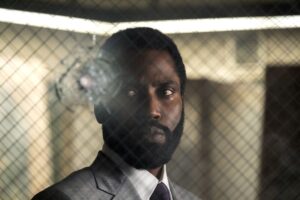Ever since Netflix’s Roma (2018) became the first film released by a streaming service to be nominated for Best Picture at the Oscars, the platform has continued to increase its bids for award season successes. The latest of these bids, The King (2019), follows the “origin story” of King Henry V’s reign over England and the subsequent encounters he has with the French monarchy. The film starts with the time just before his ascension, showing a young Henry (Timothée Chalamet) who couldn’t care less about being king. He lives a life outside of the palace, engaging in routine debauchery that allows him to escape the tenuous relationships he has with his father, King Henry IV (Ben Mendelsohn), and his brother, Thomas of Lancaster (Dean-Charles Chapman). Despite this, when Thomas faces his first battle against a rebelling noble family, Henry comes to his aid, preserving his father’s throne. As Henry IV later lies dying, he gives his crown to the young prince, unknowingly starting the reign of one of the greatest warrior kings of England.
Shortly after, Henry finds himself entwined in rising tensions with the French monarchy. Despite his deep reluctance and questioning of multiple authority figures around him, Henry is eventually persuaded to address the hostility head on, taking his army to the shores of mainland Europe with the intention of confronting the Dauphin of France (Robert Pattinson) directly. Bloodshed, heartbreak, and betrayal ensue, leaving the viewer with the same sense of weariness that Henry displays throughout the movie. The King, after drawing you into its dark, grimy world of the late Middles Ages, eventually spits you back out with only the slightest bit of hope for Henry’s future.
Derived from Shakespeare’s famous plays entitled Henry IV Parts 1 & 2 and Henry V, Australian director David Michôd’s retelling of this history mixes the different styles of screen and stage in a unique way that will certainly divide viewers. Although there are one or two action-packed moments, including a long battle sequence, most of the movie is broken up into shorter, dialogue-driven scenes. In this way, The King is very much like a play, building up slowly and gradually until the tension reaches its peak. If you’re the type of viewer who needs a regular dose of excitement throughout a plotline, then this would not be the film for you. If you can hunker down and sit through many serious conversations that lead to a great climax, then The King will suit you just fine. If you’re somewhere in the middle, then I will say that the casting directors certainly made it their priority to pick actors who are able to carry a two-hour-long movie with just conversation.
Coming off the wave of successes like Call Me By Your Name (2017), Ladybird (2017), and Beautiful Boy (2018), this movie was Timothée Chalamet’s chance to prove his capacity for consistent excellency across genres. He mostly succeeds in this, though there are some issues. Coming at this from the perspective of somebody who’s never read Shakespeare’s works surrounding this story, I saw Chalamet’s Henry V as appropriately weighed down by his circumstances, but also a little lacking in emotive facial expressions. Although the characterization is a tad too brooding to make for a bold performance, the times when Chalamet allows for Henry to break into a slight smile or show signs of complex emotion are deeply impressing. In addition, Chalamet’s slightly nasal, posh British accent lands well, allowing me to forget his other roles and see him as fully enveloped by this story.
The other two stand out performances are unquestionably those of Joel Edgerton as Sir John Falstaff and Robert Pattinson as the Dauphin of France. Falstaff’s humor is a much-needed break from the monotony of the movie and his gruffness at certain points matches the overall tone of the film well. Robert Pattinson’s Dauphin, contrastingly, is quite over the top—in the best way possible. In my initial review of the trailer, I voiced my concern for Pattinson’s humorously exaggerated French accent, but I’m happy to say that it adds beautifully to the overall experience of the movie. Like Falstaff, Pattinson’s Dauphin brings welcome comic relief, and even a slight creepiness, that makes every scene he is in that much more entertaining to watch. Though, the scene towards the end where he repeatedly slips in the mud is almost so over-the-top funny that it felt pulled from an entirely different movie. Without these two performances, The King surely would not have been nearly as watchable.
I anticipate that the biggest complaint made about this movie will be the dim lighting in combination with the grey and brown color palette—none of which do much for the unexciting plot. Let me address this by reiterating that this movie is not for everyone and is certainly not a movie to watch casually. With its length and monotonous color scheme the movie can drag, but that does not make it a complete bore of a film. On top of the sound acting performances, the sets and costumes feel incredibly genuine. There is also a good number of shots that are downright gorgeous, particularly the ones during the siege of the first French castle, wherein none other than fire catapults are used.
Given an interest in the subject matter, or even of period pieces in general, viewers of The King can enjoy following the early reign of one of England’s most well renowned rulers in a slow burn fashion with the added bonus of solid acting performances peppered throughout. For those disfavoring dialogue-heavy movies or those sensitive to largely uneventful plots, The King will give you a good opportunity to take a solid nap.






